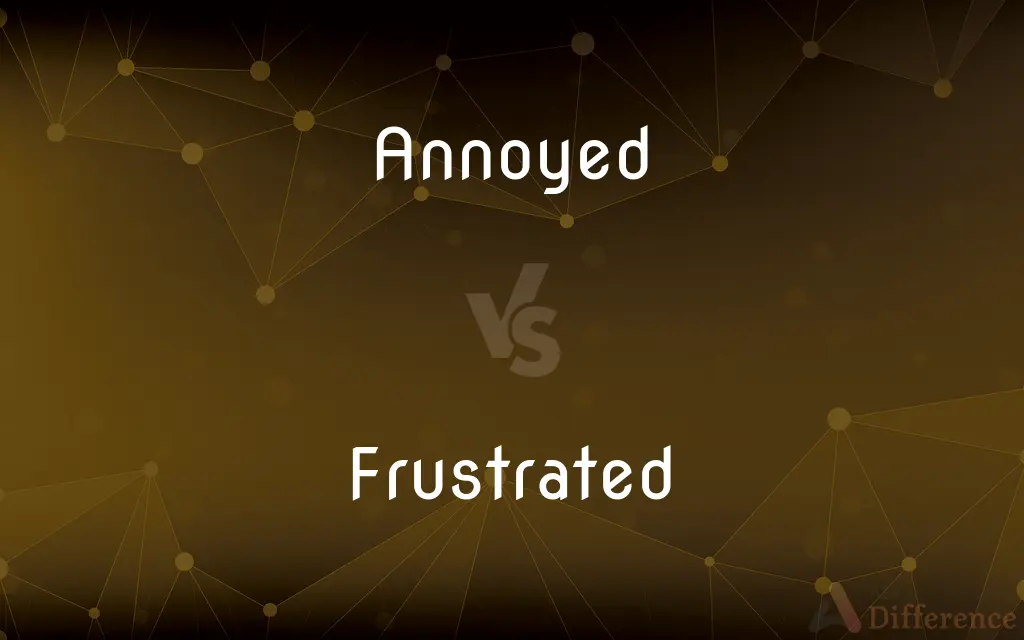Annoyed vs. Frustrated — What's the Difference?
By Fiza Rafique & Urooj Arif — Updated on March 11, 2024
Annoyed refers to a mild irritation often caused by a nuisance or inconvenience, while frustrated denotes a deeper feeling of upset or discouragement due to obstacles blocking goals or desires.

Difference Between Annoyed and Frustrated
Table of Contents
ADVERTISEMENT
Key Differences
Being annoyed typically arises from minor irritations or disturbances that may momentarily disrupt one's peace or comfort, such as a persistent noise or a small inconvenience. Frustration, on the other hand, stems from encountering significant obstacles or challenges that prevent the achievement of a goal, leading to feelings of helplessness or defeat.
The state of annoyance is usually short-lived and can be triggered by trivial matters that do not significantly impact one's overall objectives or well-being. In contrast, frustration is often associated with a persistent state of dissatisfaction, where repeated attempts to overcome a hurdle are unsuccessful, leading to a sense of stagnation or hopelessness.
While annoyance can often be resolved or dissipated with minimal effort or by removing the irritant, frustration may require more substantial changes, problem-solving, or adaptation to overcome the underlying issues causing the blockage or delay in progress.
In terms of intensity, annoyance is generally considered less severe than frustration, which can encompass a wider range of emotions, including anger, despair, and demotivation. The escalation from annoyance to frustration can occur if the initial irritant persists or compounds, leading to more significant emotional turmoil.
Socially and in communication, expressing annoyance might involve minor complaints or expressions of discomfort, whereas conveying frustration may entail more emphatic communication, highlighting deeper issues or dissatisfaction with a situation that requires attention or resolution.
ADVERTISEMENT
Comparison Chart
Cause
Minor irritations or inconveniences.
Significant obstacles blocking goals.
Duration
Generally short-lived.
Can be persistent or long-lasting.
Intensity
Mild irritation.
Stronger feelings of upset or discouragement.
Resolution
Often easily resolved by removing the irritant.
May require substantial changes or problem-solving.
Emotional Range
Primarily irritation or slight discomfort.
Can include anger, despair, and demotivation.
Compare with Definitions
Annoyed
Feeling bothered by a minor inconvenience.
She was annoyed by the constant dripping of the faucet.
Frustrated
Feeling hindered in achieving goals.
He felt frustrated by the constant delays in the project's progress.
Annoyed
A temporary state of discomfort.
He was annoyed by the bright screen in the dark room.
Frustrated
A state that may require substantial effort to overcome.
She was frustrated with her lack of progress in learning the new skill.
Annoyed
Experiencing mild irritation.
Loud chewing sounds always annoyed him during meals.
Frustrated
Experiencing a sense of defeat or discouragement.
The lack of clear instructions left her feeling frustrated.
Annoyed
A reaction to a petty nuisance.
Being interrupted repeatedly left her feeling annoyed.
Frustrated
A reaction to significant obstacles.
Frustrated by the bureaucracy, he sought alternative solutions.
Annoyed
Easily triggered by small disturbances.
She felt annoyed when her routine was slightly altered.
Frustrated
Can lead to a range of stronger emotions.
The team's repeated failures led to a collective sense of frustration.
Annoyed
To cause irritation to (another); make somewhat angry.
Frustrated
Feeling or expressing distress and annoyance resulting from an inability to change or achieve something
Young people get frustrated with the system
Annoyed
(Archaic) To harass or disturb by repeated attacks.
Frustrated
(of a person) unable to follow or be successful in a particular career
A frustrated actor
Annoyed
Simple past tense and past participle of annoy
Frustrated
To prevent (someone) from accomplishing a purpose or fulfilling a desire; thwart
A persistent wind frustrated me as I tried to rake the leaves.
Annoyed
Troubled, irritated by something unwanted or unliked (an annoyance); vexed.
Frustrated
To cause feelings of discouragement, annoyance, or lack of fulfillment in
She was frustrated by his inability to remember her birthday.
Annoyed
Aroused to impatience or anger; as, feeling annoyed by the constant teasing.
Frustrated
To prevent from coming to fruition or fulfillment; render ineffectual
Frustrated his ambition.
Frustrated their scheme for reform.
Annoyed
Troubled persistently especially with petty annoyances.
Frustrated
Simple past tense and past participle of frustrate
Annoyed
Aroused to impatience or anger;
Made an irritated gesture
Feeling nettled from the constant teasing
Peeved about being left out
Felt really pissed at her snootiness
Riled no end by his lies
Roiled by the delay
Frustrated
Foiled, stopped, disappointed.
Annoyed
Troubled persistently especially with petty annoyances;
Harassed working mothers
A harried expression
Her poor pestered father had to endure her constant interruptions
The vexed parents of an unruly teenager
Frustrated
Suffering from frustration; dissatisfied, agitated, and/or discontent because one is unable to perform an action or fulfill a desire.
Frustrated
(of a felony or serious criminal offense) Imperfect form of execution of a crime in that, despite performing all the acts that should produce it, the crime fails to be consummated.
A frustrated robbery may financially cripple the company or lead it to recover; a frustrated homicide or murder leaves the victim injured or wounded, not killed.
Frustrated
Disappointingly unsuccessful;
Disappointed expectations and thwarted ambitions
Their foiled attempt to capture Calais
Many frustrated poets end as pipe-smoking teachers
His best efforts were thwarted
Common Curiosities
What triggers annoyance?
Annoyance is triggered by minor irritations, nuisances, or inconveniences that disrupt one's comfort or peace momentarily.
Is frustration always negative?
While often viewed negatively, frustration can also serve as a motivational force, prompting individuals to find creative solutions or to reevaluate and adjust their goals.
How can frustration be addressed?
Frustration can be addressed by identifying the underlying obstacles, employing problem-solving strategies, and making necessary adjustments or seeking alternative paths to goals.
Can annoyance be managed easily?
Annoyance can often be managed or alleviated by removing the irritant or by employing simple coping strategies, such as taking a brief break or adjusting one's environment.
How do people typically express frustration?
Frustration is typically expressed through more emphatic communication, including descriptions of the obstacles faced, the efforts made to overcome them, and the emotions experienced due to blockages.
How do social interactions influence annoyance and frustration?
Social interactions can both mitigate and exacerbate feelings of annoyance and frustration, depending on the nature of the interactions and the support or additional obstacles they present.
Can annoyance lead to frustration?
Yes, if minor irritants persist or compound, annoyance can escalate into frustration, particularly if they begin to impede goals or desires.
Can external factors like environment or noise level affect feelings of annoyance or frustration?
External factors, including environmental conditions and noise levels, can significantly impact one's likelihood of experiencing annoyance or frustration.
How do cultural factors influence the perception of annoyance and frustration?
Cultural norms and values can shape what is considered annoying or frustrating, influencing both the triggers for these emotions and the socially acceptable ways of expressing them.
How do annoyance and frustration impact relationships?
Annoyance and frustration can strain relationships if not communicated effectively or if the underlying causes are not addressed collaboratively.
What are the long-term effects of frustration?
Long-term frustration can lead to stress, demotivation, and even burnout if not addressed, highlighting the importance of effective coping mechanisms and problem-solving.
Is it possible to feel both annoyed and frustrated simultaneously?
Yes, it's possible to experience both emotions simultaneously, especially if minor irritants are part of broader challenges blocking one's goals.
How does one's temperament affect their susceptibility to annoyance or frustration?
An individual's temperament can greatly influence their threshold for annoyance and frustration, with some people being more prone to these emotions due to personality traits or stress levels.
Can mindfulness or meditation help in managing frustration?
Mindfulness and meditation can be effective tools in managing frustration by promoting awareness of one's emotional state and fostering a calmer response to challenges.
What role does resilience play in coping with frustration?
Resilience plays a crucial role in coping with frustration, enabling individuals to bounce back from setbacks and persist in the face of obstacles.
Share Your Discovery

Previous Comparison
Assemblage vs. Collage
Next Comparison
Tinkle vs. WinkleAuthor Spotlight
Written by
Fiza RafiqueFiza Rafique is a skilled content writer at AskDifference.com, where she meticulously refines and enhances written pieces. Drawing from her vast editorial expertise, Fiza ensures clarity, accuracy, and precision in every article. Passionate about language, she continually seeks to elevate the quality of content for readers worldwide.
Co-written by
Urooj ArifUrooj is a skilled content writer at Ask Difference, known for her exceptional ability to simplify complex topics into engaging and informative content. With a passion for research and a flair for clear, concise writing, she consistently delivers articles that resonate with our diverse audience.
















































